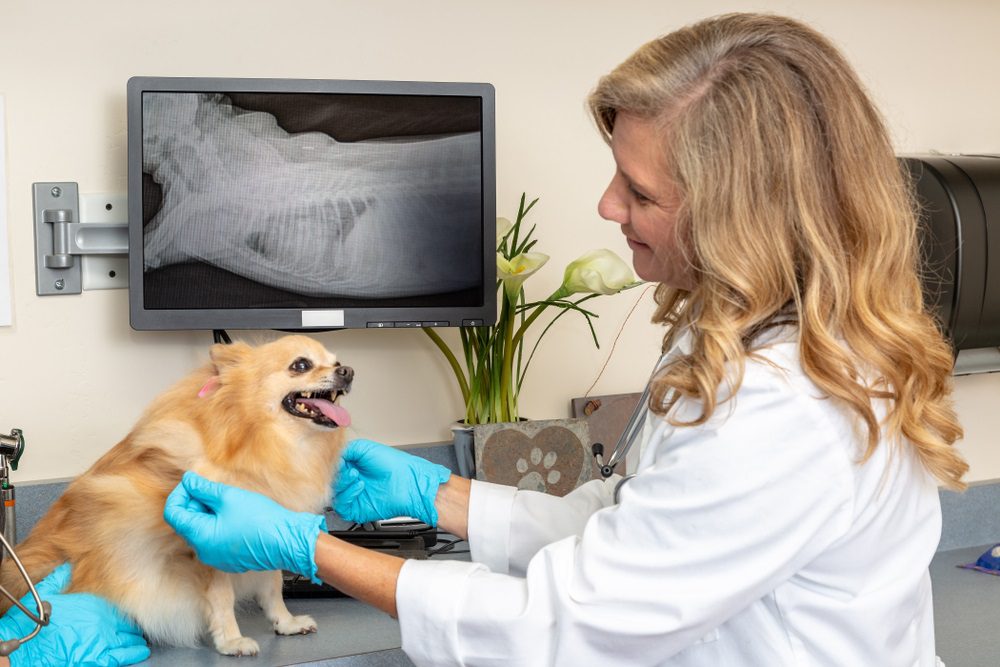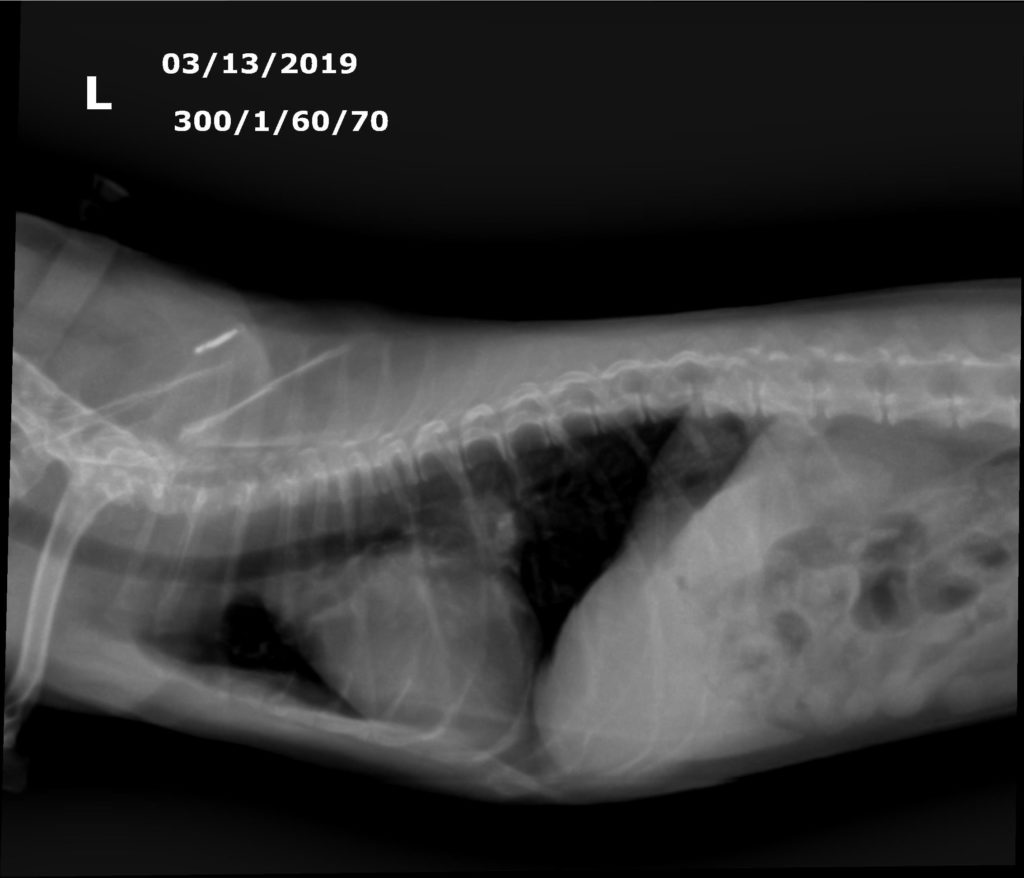If you are a regular reader of ChiChis And Me, then you know that my Pebbles has had an enlarged heart (DCM) and a heart murmur for about 5 years at this writing.

What Is A Heart Murmur?
Just like us, a dog’s heart pumps blood through the body. If the heart is healthy, there is a regular beat. A heart murmur causes an interruption in that steady beat. A veterinarian can distinguish that interruption with a stethoscope. Grading the heart murmur is a tool that they use to determine the cause. On a scale of 1 to 6, according to the AKC they are:
- Grade I murmurs are the least serious and are barely detectable with a stethoscope.
- Grade II murmurs are soft, but your veterinarian can hear them with the help of a stethoscope.
- Grade III murmurs have a loudness that falls in the middle of grades II and IV. Most murmurs that cause serious problems are at least a grade III.
- Grade IV murmurs are loud and can be heard on either side of the chest.
- Grade V murmurs are very loud and can be heard with a stethoscope without difficulty, and can also be felt by holding a hand against the dog’s chest.
- Grade VI murmurs, like grade V murmurs, are very loud and can be felt through the chest wall, and are the most severe of the heart murmurs.
What Causes A Heart Murmur?
In general terms, the cause of a heart murmur in dogs can be listed in a few categories of disturbance of blood flow. They can be caused by:
- abnormal valves or vibrations
- obstruction, diseased valves, or dilated vessels
- regurgitant flow
What Is The Treatment For A Heart Murmur?
A heart murmur can not be treated. Heart murmurs are usually caused by an underlying condition. Your veterinarian will treat the underlying cause once that is determined. Heart murmurs in very young dogs may even resolve themselves.
Valvular Disease
Heart disease in dogs is almost as common as it is in humans. However, heart disease in dogs is not caused by smoking nor is it caused by a fatty diet.
The most common form of heart disease is valvular disease. Valvular disease primarily affects small breed dogs over 5 years old.
Without getting too technical, valvular disease can be explained this way.
“Unoxygenated blood returns from the body to the heart by entering the right atrium and then pumped into the right ventricle. The right ventricle pumps blood into the lungs where it picks up oxygen. Oxygenated blood flows from the lungs into the left atrium before flowing into the left ventricle. From the left ventricle, oxygen-rich blood is pumped throughout the body”. According to VCA Hospitals.
What Causes Valvular Disease?
Because of the high pressure created when the left ventricle contracts and pumps blood out to the body, the mitral valve may begin to ’wear out’ and leak over time. This is often associated with a heart murmur.

What Is The Treatment For Valvular Disease?
A leaky heart valve can be replaced in humans, however, this is usually not feasible in dogs. There are drugs that veterinarians use to improve heart function. The most common include:
- ACE inhibitors (benazepril, lisinopril, captopril, ramipril, and quinapril)
- Diuretics (Furosemide, Lasix)
- Cardiac glycosides (Digoxin, Cardoxin®, Lanoxin®)
- Vasodilators (many different drug names the common ones are Vetmedin, benazepril, etc.)
- Beta-blockers (Sectral, atenolol (Tenormin), bisoprolol (Zebeta), metoprolol (Lopressor, Lopressor LA, Toprol XL), nadolol (Corgard), timolol (Blocadren).
- Inotropes (Enalapril (Enacard, Vasotec), Benazepril (Lotensin), Lisinopril (Prinivil, Zestril).
Enlarged Heart (DCM)
An enlarged heart is pretty self-explanatory, It’s just that, a heart that is enlarged. With DCM both upper and lower chambers of the heart become enlarged with one side being more severely affected than the other.

When the ventricle (lower chamber) becomes enlarged it loses its ability to pump blood into the lungs and fluid begins to accumulate in the lungs. The heart soon becomes overloaded and often leads to congestive heart failure (CHF).
What Causes An Enlarged Heart (DCM)?
Actually, the cause is really unknown. Nutritional deficiencies can contribute. Although any breed can develop the disease, studies have shown that some breeds have a genetic susceptibility to DCM.
What Is The Treatment For DCM?
There is no cure for DCM and the treatment is focused on improving the heart’s function and treating the symptoms. Many of the same drugs mentioned to treat valvular disease are used to treat DCM.
Is Your Dog At Risk?
Although any dog breed can develop any of these diseases of the heart, it has been shown that small breeds are prone to developing them.
Studies have also shown that male dogs are more likely to develop heart disease than females.
Breeds That More Commonly Develop Heart Disease
- Chihuahua
- Miniature Schnauzer
- Shih Tzu
- Maltese
- Toy Poodle
- Cavalier King Charles (are most at risk)
Most forms of heart disease in dogs cannot be prevented. There are contributing factors, however such as poor diet, periodontal disease, and obesity.
Although, there is one exception. Heartworm disease. Heartworms can cause life long damage to the heart. It is completely preventable. Keeping your dog on year-round heartworm preventatives can protect them from getting this deadly disease.
The goal is early diagnosis and treatment. Yearly veterinarian exams (every 6 months is even better if one of the above-mentioned breeds) can help catch the disease early and treatment can begin to prolong the progression.
During the visit, your veterinarian will listen to your dog’s heart for murmurs or irregular rhythms. If any are detected additional tests may be done. X-rays, ultrasounds, or ECGs may determine the cause and the right treatment. Starting treatment early can improve your dog’s quality of life as well as extend his life expectancy.
My Pebbles has been on medication and we get routine x-rays annually to keep an eye on the progression. See: Update On Pebbles and DCM.
Can CBD Oil Help?
While CBD oil will not cure heart disease, it certainly can promote cardiovascular health. How?
- reduces the damage from damaged blood vessels and irregular heart rates
- protect blood vessels from damage and dilate the arteries
- reduce heart rate and blood pressure associated with stress and anxiety

Sources include Veterinary Medical Teaching Hospital, Pet MD, Pet Health Network.









